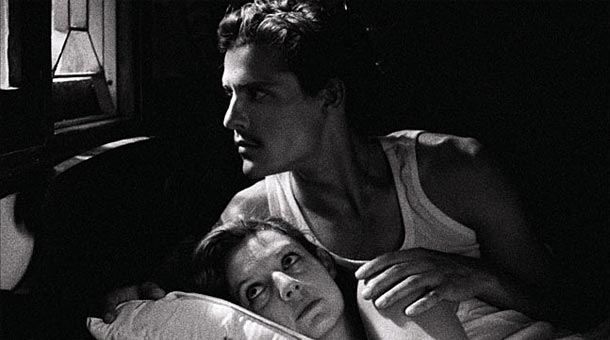
Miguel Gomes serves up a charming third feature, though fully appreciating the film requires some patience.

Miguel Gomes serves up a charming third feature, though fully appreciating the film requires some patience.
Right on the heels of two successful films that paid respect to the history of cinema, The Artist and Hugo, Tabu receives its title from the final film from one of cinema’s great romantics, F.W. Murnau, and serves as a love letter to the era. Critic-turned-filmmaker Miguel Gomes serves up a charming third feature, though fully appreciating the film requires some patience.
Part one is entitled Paradise Lost and follows a woman named Pilar (Teresa Madruga) who seeks company from anyone she can. The fact that she never manages to crack a smile, suggests that her life is rather gloomy. All that is known about her is that she is a practicing Catholic who spends time protesting outside the U.N. and enjoys watching cinema. When a Polish backpacker cancels plans to stay with her, Pilar spends more time with her elderly neighbor Aurora (in this part played by Laura Soveral). It is clear that Aurora has a gambling problem when she asks Pilar to pick her up from the casino after she runs out of funds. But her addiction is not what is alarming; Aurora’s mental state is declining, to the point that she is admitted to the hospital. Her last request is to have Pilar track down her former lover, Gian Luca Ventura (Henrique Espirto Santo).

When Pilar meets up with Ventura over coffee the film seamlessly transitions into its second part, appropriately named Paradise. During this half of the film, no actual dialog is spoken by the characters. Though it is not considered to be a silent film as it is narrated by the elderly Ventura who recalls the story of how he and Aurora first met. Also present are subtle ambient background noises such as birds chirping or water trickling, that provide a layer of texture.
After learning about the young Aurora (played by Ana Moreira), her senile outbursts about being in Africa and her talk of crocodiles suddenly make more sense to Pilar. It is confirmed that she actually did live in Mozambique and that she found a baby crocodile that she adopted as her pet. Her gambling problem later in life was inherited from her father who first suffered the addiction.
More details unfold about how Aurora and Ventura first met and it becomes clear that the heart of the story regards the forbidden nature of their romance. The two were separated by the different Portuguese social circles they ran with. Aurora was married, wealthy and pregnant and Ventura was part of a rock n’ roll band with the personality to match. Despite the doomed nature of their love, they held tightly to the love they felt for one another.
Tabu is incredibly well-written, and for better or for worse, no detail is left out. Background details are given to characters that do not seem all that important, especially in the first half of the film. It can be a lot to take in for such a simple love story but thanks to Gomes’ visually compelling filmmaking, the film is absolutely beautiful to watch.
Compositions of the rugged African wilderness are second to none, capturing the farming fields and distant mountains of Mozambique. Through the use of black and white photography in a 1:37:1 aspect ratio combined with being shot on 16mm, the film pays homage to 1950’s cinema. Gorgeous shots ranging from a blistering African sun to a cloudy downpour of rain, set the tone of the film with a sharp contrast of atmosphere and emotion.
Tabu, while comprised of two distinct parts that could easily be separate films, weaves it’s stories together to make one whole, told backwards to great affect. The majority of time is spent following Pilar in the beginning as she represents a movie audience, looking to fulfill the mundanity of her life with something cinematic. Her life is given the dramatic romance she craves as for both her and the audience, Aurora’s vibrant past comes to life.